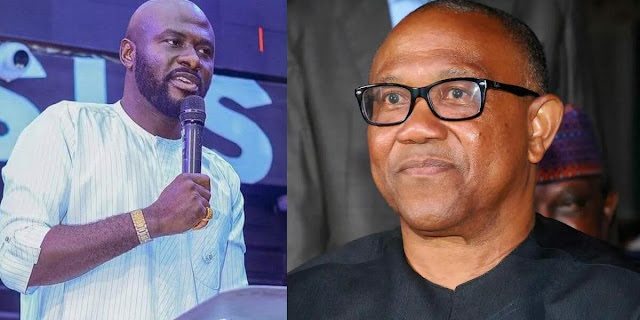A Nigerian clergyman, Prophet Abel Boma, has stirred significant attention with a recent prophecy concerning Peter Obi, the Labour Party’s presidential candidate in the 2023 general election and a key figure in the country's political landscape as the 2027 race looms.
Shared through a video on his official YouTube channel, the prophecy paints a complex and cautionary picture regarding Obi's political future. According to Boma, while Obi may seem destined for leadership in the eyes of many, hidden traps and spiritual disapproval await him on the journey.
Boma did not mince words in expressing his deep concern over what he described as a looming betrayal targeted at the former Anambra governor. He claimed that a carefully orchestrated deception could publicly humiliate Obi at a crucial moment in his political pursuit.
"Let’s pray for Peter Obi," Boma said during the broadcast, his tone a blend of urgency and concern. "While I saw him sitting, at the end, they called him a fool publicly. The Lord said it is because of deceit; he will be deceived. They will say you’re the one we chose, but at the end of the last preparation to come out as the number one citizen, they will betray him."
According to the cleric, this betrayal is not only political but spiritually consequential. He warned that the forces behind the deception are powerful and strategic, suggesting that Peter Obi's trust in certain individuals may become his undoing.
Despite acknowledging some of the reforms Obi might champion if given the opportunity to lead, Boma did not refrain from issuing spiritual cautions. He stated that Obi's potential leadership, though capable of initiating substantial educational reforms, might set him on a collision course with religious interests.
Highlighting specific areas of concern, the prophet stated that Obi’s administration could adopt policies that indirectly or directly affect the church in Nigeria. “The number one thing that Peter Obi is going to do if he becomes the president, which we know is somehow doubtful, is that he is going to create a diplomacy against the church,” Boma declared.
He went on to add, “Number two, he is not going to look at the economy; he will mostly look at the education sector, which is good, very nice. And number three, there are some things he will do in the northern community which will trigger anger.”
Boma's prediction suggests that even positive intentions like prioritising education may be overshadowed by missteps in handling religious and regional sensitivities. He explained that while these reforms may be well-meaning, they could inadvertently spark tensions, particularly in the North, a region often pivotal in Nigeria’s electoral outcomes.
A more alarming part of the prophecy revolved around what Boma described as Obi’s choices being at odds with divine principles. The prophet claimed that the most concerning aspect of Obi's potential presidency lies in what he termed as "the choice against the kingdom of God."
“There is only one thing that the spirit of God is not happy with, and it is the choice of Obi against the kingdom of God,” Boma asserted. He declined to give full details but hinted at having knowledge of "ten things" that would unfold should Obi assume office. Among them, he ranked the spiritual disconnect as the most troubling.
Urging Christians and fellow Nigerians to pray fervently, Boma called for divine guidance to avert what he believes could become a moral and political misadventure. “We need to pray against that,” he concluded.
Reactions to Boma’s prophecy have been mixed across social platforms. Supporters of Peter Obi view the message with skepticism, arguing that such prophecies often emerge as political tactics designed to sway public opinion. Others have taken the message seriously, calling for spiritual reflection and intercession.
As Nigeria moves closer to another general election season, Boma's prophecy adds to the growing narratives shaping the political discourse. Whether viewed as a divine warning or just another controversial religious opinion, it underscores the complex relationship between faith and politics in Africa’s largest democracy.













![Content Creator Angelica Kelechi Speaks Out on Alleged Sexual Assault at Khloe Abiri’s Spa [VIDEO]](https://blogger.googleusercontent.com/img/b/R29vZ2xl/AVvXsEgQStip4cn2DAOvQ2hNFU30OAFWoxfQIDOnStd0uVgwwxKrFAQYYvtFni6QV04OGP8dyKk5TCAhXM5es9linl1ClhjPzaazz2tTt0LmJ5lFVe5202o2McF9QROT1v2hEyNTdY-M1KRuLTY6OqqysKNfcsY5bCtwCIP8wEQ4AXcfQfTaXWWZiixqf82NDH5a/w72-h72-p-k-no-nu/abiri-khloe123.jpg)






0 Comments
Hey there! We love hearing from you. Feel free to share your thoughts, ask questions, or add to the conversation. Just keep it respectful, relevant, and free from spam. Let’s keep this space welcoming for everyone. Thanks for being part of the discussion! 😊